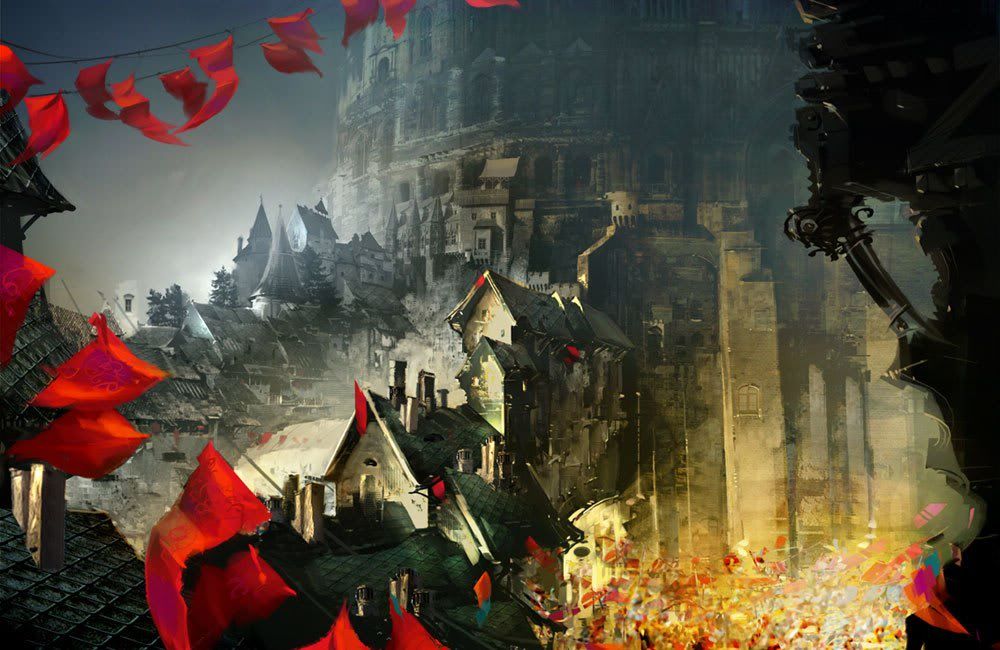 Imperium Citizenship
Imperium CitizenshipMost people in the Imperium are Citizens. The child of a citizen is automatically a citizen, and for 250 gp, virtually anyone can go through the process of procuring citizenship. All citizens are issued papers proving their citizenship. These Imperium Citizenship Papers show a person’s name, age, place of birth, place of residence, family members, employment, and a general physical description. They also record past residences and major travels. These identification papers are an important tool for the Imperium to keep tabs on—and therefore control—its population. They also give City Watch guards, officials, and others an idea of how they ought to treat a given person. Typically, all humans, all dwarves, all halflings, most elves, most half-orcs, and most gnomes are citizens. Some 1/2 ogres and centaurs are citizens. Very few lizardfolk or dragonkin are citizens. Virtually no goblins, orcs, minotaurs, or similar creatures are citizens. Ratmen, demons, and truly monstrous creatures are never citizens. Imperial citizenship ends upon one’s death (although it is reinstated if the person is raised), so undead are never citizens.
 Subjective Law Enforcement
Subjective Law EnforcementIt would be naive to think that, just because certain actions require permits, everyone who undertakes such actions always has them. No one building in the Warrens obtains a permit first, and there are far more illegal prostitutes and gambling dens than legal ones (to avoid both license fees and taxes).
There are crimes so serious that, although they may not carry the penalty of death, if someone killed the perpetrators while attempting to stop them, the authorities would not bat an eye. For example, say you come upon two KillRavens beating a sister of the Silent Order within an inch of her life. For this crime of assaulting an official, they should receive up to twenty years imprisonment. However, no judge in Gratis would say a word against a band of adventurers who came upon the scene and slew the assailants. Typically, a thief has his forehead branded to warn potential victims. Sometimes a pickpocket has a finger removed, and castration as punishment for rapists is standard in the city. In Gratis, if a child commits a crime, his parents are legally responsible for facing the punishment.
The City Watch is closer to an occupying military force than an urban police force, and are more interested in order than justice, and more interested in the well-being of the city as a whole than in the needs of a particular citizen. Since criminal investigations are rare, this means that people who take action into their own hands can break into a crime lord’s safe house, kill all the thugs and cutthroats inside, and—as long as they make good on their escape before the Watch shows up—they can get away without fear of punishment. The concept of citizens “taking the law into their own hands” is not considered a bad thing in Gratis. Local authorities, from the lowest-ranking guard to the Commissar himself, are quite practical in this regard. In an effort to maintain order, they do what’s best for the city rather than strictly uphold all the laws of the Vast Codex. If an angry mob finds and lynches a kidnapper of children, the authorities not only don’t intervene, they don’t make arrests. They go out of their way not to get involved. In most cases, the City Watch would rather not even know about it, to avoid the bureaucratic paperwork. The guards are happy to look the other way in such instances.
Imperial lawmakers recognize the need to defend oneself against aggression. “Self defense,” a very common defense in murder or assault cases, often results in acquittal and complete exoneration for the accused.
Crime and “Monsters”Nonhumanoid creatures have no rights under Imperial law. In other words, it is not murder to slay a dragon, it is not assault to attack a troll, and it is not theft to rob from a manticore’s hoard. Exceptions have been made, however, in the case of beings like Urlexus, ogre-mage Star of the City Watch, and Shrugata, minotaur cleric of the Church, who clearly have found a place in civilized society.
 Monsters in the City
Monsters in the CityUnlike most cities in Campaigns, it’s not too out of the ordinary to see “monsters” in the streets. Nobles use ogre slaves to carry palanquins. Elf battle mages ride a wyvern through the streets. At least one local druid has a giant owl companion. In 712 IA, the Commissar himself offered to pay volunteers to be polymorphed into trolls to contribute to the city’s defense. (He found only a handful of takers.) It’s almost odd not to see a dragon on the grounds of House Calaspers estate. A strange ocular tyrant runs the asylum for insane arcanists. And, of course, there are the creatures redeemed by the Brotherhood of Redemption, not the least of which is the ogre-mage cleric Urlexus.
SlaveryOwning a slave is not illegal in Gratis—although it does raise eyebrows. Kidnapping people to sell as slaves is illegal, as is selling slaves. Abuse of anyone, including slaves, is also illegal. Of course, all these things still go on, more in some circles than others.
One commodity traded in the Market is fiendish slaves bound to magical amulets that compel them to obey the owner. These amulets contain the essence of the fiend or some important fraction thereof. The Calasper family forged its criminal empire by creating and selling these amulets and continues the practice. The fiends, forced to come into this world from Hell against their will, are immediately bound to the amulet, then secreted away in some secret chamber of the Calasper estate until the amulet is sold. At that time, the new owners can call the fiends to them at will and give them whatever command they wish. The price for a fiend slave amulet is the creature’s CR squared, multiplied by 500 gp. Obviously, if an amulet’s owner ever allows it to fall into the hands of the fiend bound to it, the fiend can steal back its rightful essence and become free to act as it wishes—which usually starts with killing the amulet’s owner in some horrible, painful fashion. This also happens if the amulet is destroyed. If the fiend is slain, the amulet becomes worthless.